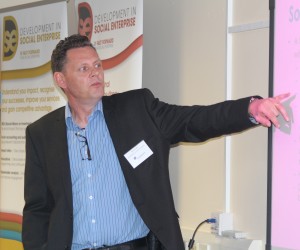Dave Lane of Development in Social Enterprise and Ranjit Bansal of DYNAMIC Marketing delivered an informative social value masterclass at the Social Value Construction Conference on 23rd April 2015.
Dave first spoke to the group about measuring social value and why organisations should measure it. He said one of the key drivers to measuring social value is understanding the change and effect on customers and the local environment. Another driver is that measuring will improve an organisations quality and performance. He also spoke about changes to the social value act and also government cuts that have impacted organisations in the sector.
Measuring social value in construction can be tricky unless you know exactly what you want to measure. Some examples could include local employment rates in construction projects, local supply chain where possible – reduction in carbon, apprenticeships provided through housing and construction organisations, local multipliers eg: new housing developments could mean new people in the economy and spending patterns could change over time.
Dave also covered the basic steps to measuring social value:
- Identify what matters to your organisation and your stakeholders “Measure what you value, don’t value what you measure”
- Identify how you will know when you have achieved your target (Indicators and KPIs)
- Understand the ‘Theory of Change’ for each stakeholder – what do they want? How has your organisation changed the stakeholder?
- Understand what is down to you and what is not
- Keep it as simple as you can
Specific measuring tools:
- Social Return on Investment (SROI) – to measure impact and change for the individual with an interest in the monetary value
- Social Accounting Audit (SAA) – planning, evaluation and improvement tool that weights stakeholders high and is not concerned with monetary value. It puts more weight onto the environmental aspects than SROI.
- AA 100 AS – a tool used mainly for larger companies and external audits.
- Balanced scorecard – plan, do, review tool that considers the environmental and economic aspects of the project
Ranjit showed attendees the ‘chain of good’ Innocent Smoothies promotional video, which is a really effective way of them marketing their social value. It tells a story to their customers, that by buying their smoothies, they are creating good around the world and creating good social value links in a chain of different people.
Ranjit also gave attendees an informative handout about the dos and don’ts of marketing social value. These included DO market your social value, not report it. DO make it easy to ‘get’ you social value – understanding and getting a clear message across to customers is key. Finally, DO master the art of storytelling. A powerful story will stay with people longer and if it is funny and interactive, people are more likely to relate to it easier.

